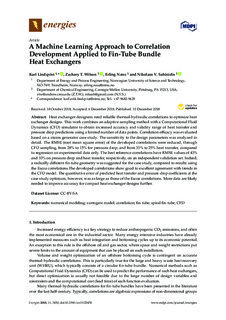| dc.contributor.author | Lindqvist, Karl Erik Artur | |
| dc.contributor.author | Wilson, Zachary | |
| dc.contributor.author | Næss, Erling | |
| dc.contributor.author | Sahinidis, Nikolaos V. | |
| dc.date.accessioned | 2019-03-05T12:12:39Z | |
| dc.date.available | 2019-03-05T12:12:39Z | |
| dc.date.created | 2018-12-12T09:48:43Z | |
| dc.date.issued | 2018 | |
| dc.identifier.citation | Energies. 2018, 11 (12), . | nb_NO |
| dc.identifier.issn | 1996-1073 | |
| dc.identifier.uri | http://hdl.handle.net/11250/2588749 | |
| dc.description.abstract | Heat exchanger designers need reliable thermal-hydraulic correlations to optimize heat exchanger designs. This work combines an adaptive sampling method with a Computational Fluid Dynamics (CFD) simulator to obtain increased accuracy and validity range of heat transfer and pressure drop predictions using a limited number of data points. Correlation efficacy was evaluated based on a steam generator case study. The sensitivity to the design parameters was analyzed in detail. The RMSE (root mean square error) of the developed correlations were reduced, through CFD sampling, from 28% to 15% for pressure drop, and from 33% to 25% heat transfer, compared to regression on experimental data only. The best reference correlations have RMSE values of 43% and 33% on pressure drop and heat transfer, respectively, on an independent validation set. Indeed, a radically different fin-tube geometry was suggested for the case study, compared to results using the Escoa correlations.The developed correlations show good to excellent agreement with trends in the CFD model. The quantitative error of predicted heat transfer and pressure drop coefficients at the case study optimum, however, was as large as those of the Escoa correlations. More data are likely needed to improve accuracy for compact heat exchanger designs further. | nb_NO |
| dc.language.iso | eng | nb_NO |
| dc.publisher | MDPI | nb_NO |
| dc.relation.uri | https://www.mdpi.com/1996-1073/11/12/3450/htm | |
| dc.rights | Navngivelse 4.0 Internasjonal | * |
| dc.rights.uri | http://creativecommons.org/licenses/by/4.0/deed.no | * |
| dc.title | A Machine Learning Approach to Correlation Development Applied to Fin-Tube Bundle Heat Exchangers | nb_NO |
| dc.type | Journal article | nb_NO |
| dc.type | Peer reviewed | nb_NO |
| dc.description.version | publishedVersion | nb_NO |
| dc.source.pagenumber | 16 | nb_NO |
| dc.source.volume | 11 | nb_NO |
| dc.source.journal | Energies | nb_NO |
| dc.source.issue | 12 | nb_NO |
| dc.identifier.doi | 10.3390/en11123450 | |
| dc.identifier.cristin | 1641987 | |
| dc.relation.project | Norges forskningsråd: 233947 | nb_NO |
| dc.description.localcode | (C) 2018 by the authors. Licensee MDPI, Basel, Switzerland. This article is an open access article distributed under the terms and conditions of the Creative Commons Attribution (CC BY) license (http://creativecommons.org/licenses/by/4.0/). | nb_NO |
| cristin.unitcode | 194,64,25,0 | |
| cristin.unitname | Institutt for energi- og prosessteknikk | |
| cristin.ispublished | true | |
| cristin.fulltext | original | |
| cristin.qualitycode | 1 | |

